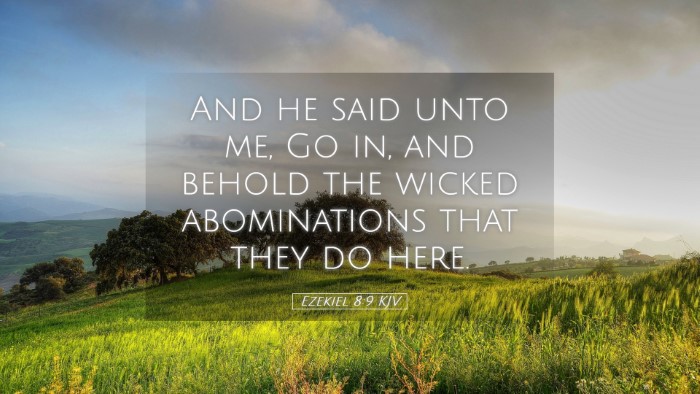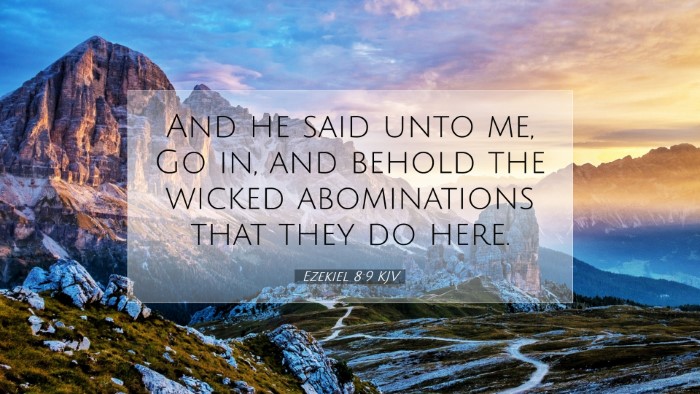Ezekiel 8:9 - Commentary and Insights
Verse: "And he said unto me, Go in, and behold the wicked abominations that they do here." - Ezekiel 8:9
Introduction
This passage from Ezekiel serves as a pivotal moment in the prophet's visionary experience, illustrating the gravity of idolatry and sin among the people of Israel. It contains profound reflections on divine judgment and the necessity of confronting the truth of human depravity. In this commentary, we will explore insights from public domain commentaries, focusing on the implications of God's command to Ezekiel and the significance of the vision revealed to him.
Historical Context
Matthew Henry highlights that Ezekiel's prophetic ministry takes place during the Babylonian exile, a time when the Israelites were grappling with the consequences of their sin. Understanding the socio-political landscape is crucial for appreciating the weight of this revelation. Ezekiel is called to bear witness to the spiritual decay of his nation, and his role is not only as a prophet but also as a seer of divine truths.
The Divine Command
The phrase "Go in, and behold" carries significant weight. Albert Barnes points out that this command emphasizes active participation in witnessing God's judgment. Ezekiel is not merely an observer; he is an agent summoned to bear witness to the harrowing reality of sin that has beset his people. This directive underscores the necessity for God's servants to confront the harsh realities of sin, acknowledging that ignorance of transgression does not absolve responsibility.
The Nature of Abominations
As Ezekiel is led to witness "the wicked abominations," it is essential to understand the term "abominations" within the context of ancient Israel's worship practices. Adam Clarke elaborates that these abominations represent a profound departure from the worship prescribed by God, involving idol worship and moral corruption. The abominations signify not only religious transgressions but also a societal degradation, showcasing how idolatry can permeate every aspect of life.
- Idolatry: The Israelites engaged in worshiping foreign gods, which contradicted their covenant with Yahweh.
- Moral Corruption: The actions accompanying this worship were often immoral, reflecting a broader societal decline.
- Spiritual Blindness: The people were often unaware or in denial of the extent of their sinfulness.
Repercussions of Idolatry
The revelations of this chapter lead to a realization of the severe repercussions of idolatry. Matthew Henry eloquently notes that idolatry leads to divine disfavor and brings about national calamity. The people's failure to recognize the seriousness of their abominations stands as a warning for future generations regarding the dangers of deviating from true worship and righteousness.
The Prophetic Role of Ezekiel
Ezekiel's prophetic role is foundational in this passage. Albert Barnes stresses that the prophet's experience is not just for his benefit but is designed to equip him to speak truthfully and boldly to the people. By witnessing the idolatry firsthand, Ezekiel gains authority in his message, underscoring the call for repentance and the impending judgments of God if the people do not turn back.
Application for Today
The call to "behold the wicked abominations" resonates today, as leaders and believers alike must confront the realities of moral and spiritual compromise within the church and society. The insights from Adam Clarke remind us that just as Ezekiel had to stand before the grim truth of his people's actions, modern Christians must also face contemporary challenges with the same courage and resolve. The consequences of idolatry and moral decay are as relevant now as they were in ancient times.
- Confronting Sin: Encouraging open discussions about sins prevalent in today’s culture, emphasizing the need for transparency and accountability.
- Revival and Repentance: Understanding that acknowledgment of sin is the first step towards seeking God’s forgiveness and restoration.
- True Worship: Exploring what it means to worship in spirit and truth, prioritizing a relationship with God above cultural trends or material pursuits.
Conclusion
The command given to Ezekiel to "go in, and behold" serves as a critical reminder of the responsibility of believers to engage with the manifestations of sin within their context. The abominations observed in Ezekiel's vision reflect a broader truth about the human condition and the urgent need for authentic worship and repentance. Through careful consideration of this passage, theologians, pastors, and scholars can find a clarion call to both recognize the seriousness of sin and the importance of upholding the integrity of worship as an act of obedience to God.


